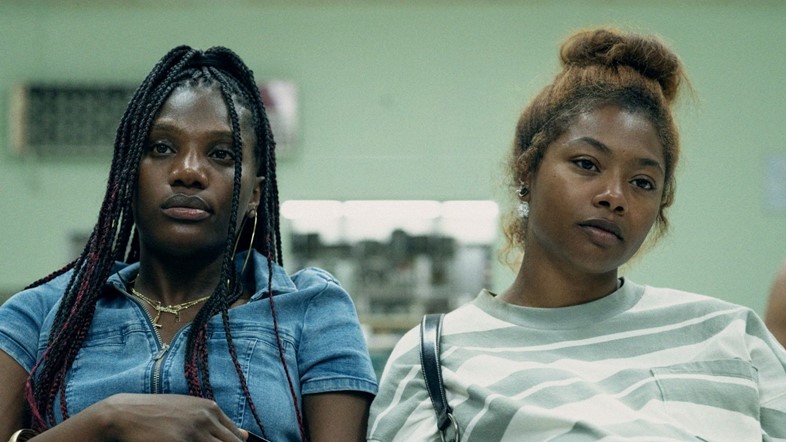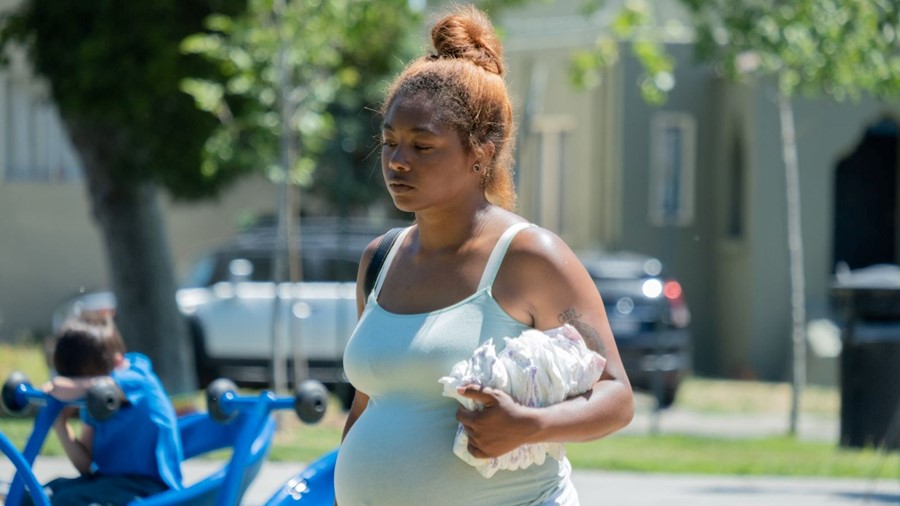As her debut film is released, director Savanah Leaf talks about pushing back against cliched portrayals of Black women in cinema
In Earth Mama, Savanah Leaf’s camera holds fast to the face of a young Black mum, Gia, as she fusses tenderly over her kids. It feels like we’re alone in the room, but then the point of view shifts and the figure of a white woman becomes visible in the background, silently intruding on the intimacy of the scene. She doesn’t say anything. She doesn’t have to. Sometimes the question of why is just a matter of framing.
Leaf’s feature debut tells the story of Gia, a recovering crack addict and mother of two trying to win her kids back from care. To complicate matters, she is also heavily pregnant, and is considering putting the baby up for adoption. Gia’s situation is tough, but by no means unique: in 2021, Time magazine declared child welfare “a new battleground” in the fight for racial justice in the US, reflecting mounting anger over a system that Leaf says is really a form of “policing”. But for Leaf, a London-born filmmaker and former Olympic volleyball player who moved with her family to the US at the age of nine, her interest in the subject grew from her own experiences with her adopted sister, which she says were “overwhelmingly positive”.
“I actually went into the film with a very positive outlook on adoption, because I love my sister to pieces, you know?” says Leaf of her sibling, some 14 years her junior, who also makes a scene-stealing cameo in the film. “But there are so many layers there. A lot of it comes down to this question of: what does it mean to be fit to parent? Who determines it, especially as it relates to Black women and Black mothers?”
To get a better read on her story, Leaf made a documentary short, The Heart Still Hums, with Bones and All star Taylor Russell in 2020. It’s here, with “just the camera, listening”, that she witnessed first-hand the trauma of Black mothers caught up in the care system. “There are all these requirements but they’re not curated or altered for people who come from different cultures or backgrounds,” says Leaf, citing ‘random’ drug tests left up to nurses’ discretion as an example of the way prejudice is encoded into the system. “And so a caseworker or a judge has their own bias when they’re comparing every mother to the set of parameters. It’s not necessarily adjusted for each human being, and the trauma they come into the system with.”
After the film’s release, Leaf opted to use a fictional lens in order to delve further into the topic, a choice she says ironically allowed for a more truthful portrayal, as mums interviewed for the doc would regularly hold back for fear of jeopardising their cases. “There are a lot of ethical questions that came up for me with that,” says the director. “It was like, ‘Do I want to be the reason why someone might not get their children back?’ There are some things you’ll never get the full truth about if you’ve got a camera in somebody’s face while they’re trying to combat child protective services.”

Earth Mama folds one woman’s complicated feelings about her predicament into a wider story of injustice. We’d call it the year’s quietest protest film, but the truth may be knottier still, Leaf revealing conflicting attitudes towards parenting among the Black community through Gia’s support network. In one cruel moment that comes off as a weird inversion of macho talk, best-friend Trina admonishes her to “step up and be a fucking mother”, and in another inspired scene, a propos of nothing, the moochers who hang around outside Gia’s door deliver poignant monologues about their own relationships with their parents. To leaven the drama, Leaf adds in magic-realist touches that mirror her themes of separation, connection and inherited trauma, with Gia dreaming of severed umbilical cords and trees in silent conversation with one another.
At the heart of it all is Gia, played by Oakland rapper Tia Nomore in her screen debut. She nails the character’s feelings of frustration, of “needing to stop herself from saying the things she really feels in order to survive,” says Leaf. And yet Gia’s refusal to live by other people’s need to define her is clear. “I don’t need no gold fuckin’ star to tell me I’m a good mother,” she snaps at a care worker in a rare moment of unchecked anger.
Mostly, though, Gia holds her peace, a trait ascribed to the character partly to push back against cliched portrayals of Black women “shouting and screaming all the time”, but also to reflect the powerlessness many such women feel in these spaces. It’s a film whose lightness of touch is evidenced in the opening scene, as an unnamed woman speaks to camera at an addicts’ meeting, dismissing the judgment of others with a wary shrug. “Everyone got something to say, everybody got an opinion … like they God. OK … OK.”
Earth Mama is out in UK cinemas now.
